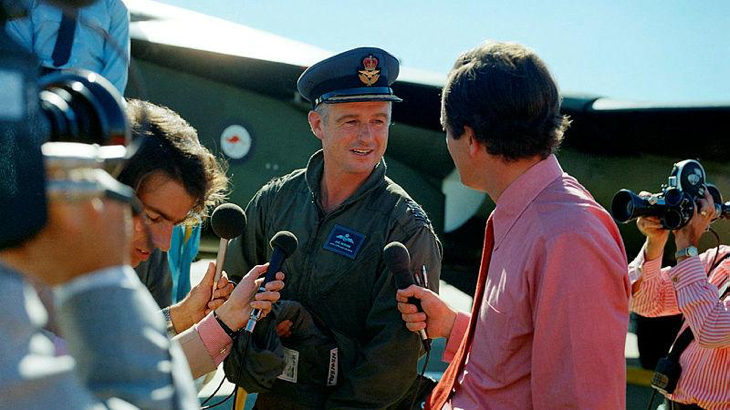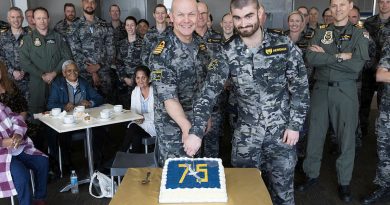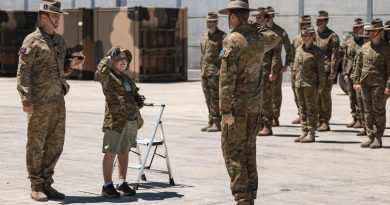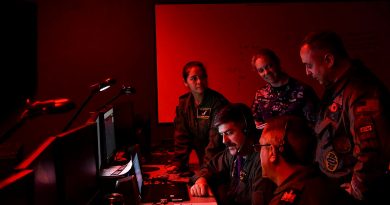Farewell to ‘Gentleman Jake’

Air Force or Army? It was a tough decision faced by a 20-year-old John ‘Jake’ Newham in 1951. Offered a place at both Duntroon and in the Air Force’s pilot training program Jake chose the Air Force. It was perhaps an example of the imminent good sense for which Air Marshal Newham was to become known.
CAPTION: Then Group Captain Jake Newham in 1973 talks to the waiting media after leading the ferry flight of six A8 F111s from Fort Worth, Texas, to Amberley, Australia. Story by RAAF Historian Martin James.
Over the next 39 years Air Marshal Newham saw operational service in the Korean War and the Malayan Emergency. He deployed to Malta as part of the Air Force contribution to NATO and rose to the rank of Air Marshal, leading the RAAF as the Chief of the Air Staff from May 1985 to July 1987.
Sadly, on December 27, 2022, the man known by many as ‘Gentleman Jake’ passed away after a protracted illness.
Air Marshal Newham once said that he was a great believer in Voltaire’s philosophy of optimism, in that ‘all are for the best in the best of possible worlds’. It was a philosophy that shaped his career, actions, belief in people and in the opportunities that could arise from difficult challenges.
The first impact Air Marshal Newham made was in the skies over wartime Korea in 1953 with 77 Squadron. From March 13, 1953 until the end of the war he flew and fought with great distinction.
Once when speaking of some of the finest examples of leadership he had experienced, Air Marshal Newham harked back to his experience in the Korean War. The mentoring and trust he saw from the senior pilots and flight commanders inspired the up and coming pilots while developing their natural abilities.
It was a lesson that shaped his own leadership and command approach.

CAPTION: Air Marshal ret. Jake Newham speaking at the Commemorative service Honouring No. 77 Squadron’s Korean War contribution. The ceremony was held at Point Cook to unveil a new plaque which includes the names of all 41 personnel of No. 77 Squadron who lost their lives. Photo by Sergeant David Grant, October 2010.
Air Marshall Newham liked to believe in people. He liked to build them up and give them a chance to excel.
After the Korean War, Air Marshall Newham was only back in Australia for a few short weeks before being deployed to 78 Wing flying Vampires based out of Malta. It was a period where his qualities as a leader, officer and tactician emerged and grew.
In the following years, 1955 to 1967, he was to fly on more combat operations in the Malay Emergency and to later qualify as a flying instructor as well as a fighter combat instructor.
Air Marshall Newham also became pivotal to the early success of two Air Force capabilities of the era. He reformed 3 Squadron with the Air Force’s first ground attack capable Mirage fighters and led the squadron on its relocation to Malaysia as part of Australia’s commitment to the Five Power Defence Arrangements.
The second moment came in 1973. The then-Group Captain Newham lead the effort in bringing the F-111 aircraft to Australia and in the development of its operational plans and concepts.
CAPTION: Arrival of first A8 F111 aircraft at Amberley. A8-125, 126, 127, 128, 129, 130 led by GPCAPT Jake Newham.
At the time the F-111 had a tarnished reputation. Air Marshal Newham though was a believer in the aircraft. He not only appreciated the strategic influence and capability of the F-111 but also recognised its potential for future upgrades. His farsighted appreciation of the F-111 contributed to its long and valuable service to Australia.
Through 1975 to 1976 as the senior operations officer at Operational Command, Air Marshal Newham managed the air evacuation of Darwin after Cyclone Tracy, the deployment of Air Force on UN peacekeeping missions as well as the evacuation of Australians from Saigon during the fall of South Vietnam.
Air Marshall Newham himself was always quick to point out that the success of these operations was due to incredibly good Air Force people in the squadrons. Typical of his humility, he did not seek recognition for his own important contributions to these incredibly consequential operations.
Many in the Air Force could see Air Marshal Newham’s qualities though. He was sent to the Royal College of Defence Studies in the United Kingdom and later served with great distinction as the Defence attaché in the US. On his return to Australia in 1984 he was appointed as the Deputy Chief and in 1985 promoted to Air Marshal and appointed as the Chief of the Air Staff.
Today, the legacies of Air Marshal Newham’s time as our Chief are still evident. The organisation of the Air Force into Force Element Groups, the establishment of Tindal and the bare bases, Jindalee over the horizon radar, air-to-air refuelling and AEW&C capabilities all found a place in Australia’s strategic future through his advocacy while the Air Force’s Chief.
In 2012 Air Marshal Newham said that the highlight of his career as a pilot was leading 3 Squadron during its transition to the Mirage aircraft.
As an Air Force member though, the greatest highlight was to serve with the people that make Air Force what it is. Many of these people became lifelong friends.
These comments encapsulate Air Marshal Newham’s’s philosophy: seek out where we might add enduring value, look for the good in people and treasure the friendships we make along the way.
.
.

.
.





